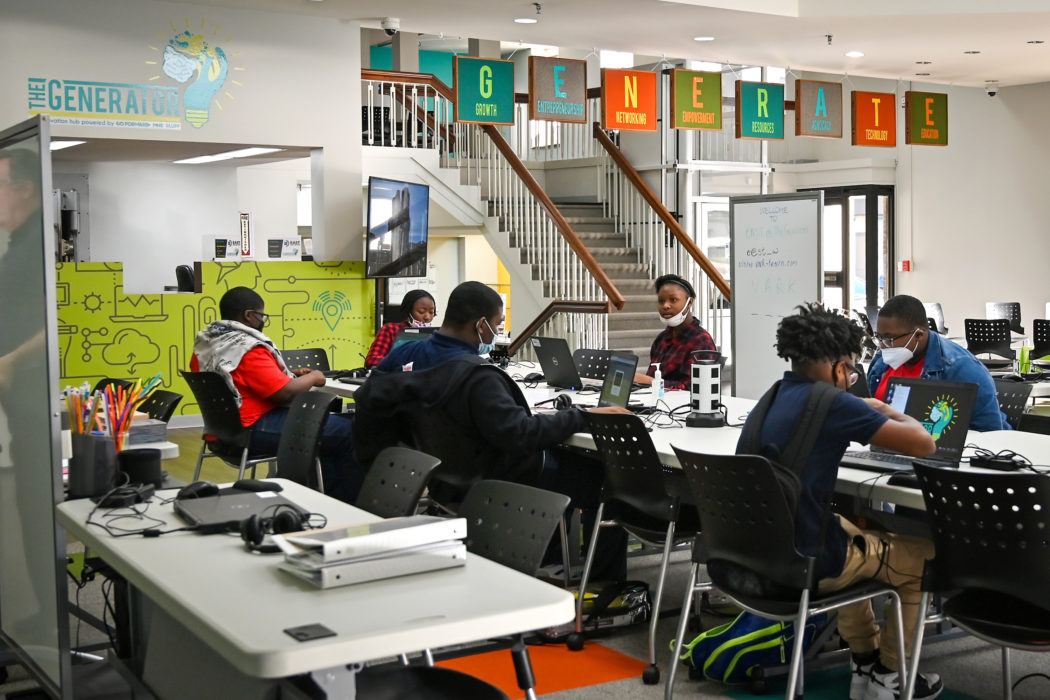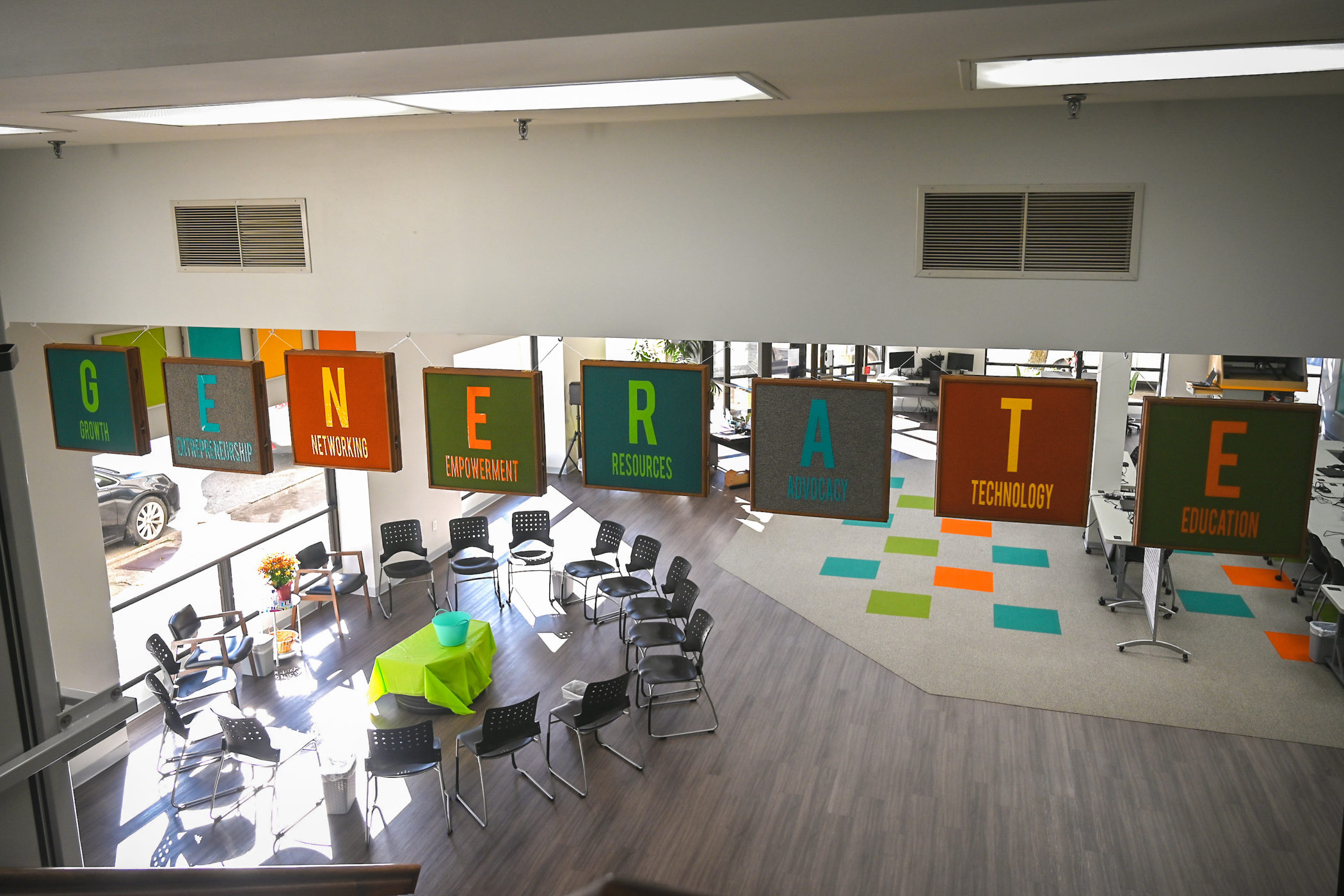Rural learners reflect on free IT Support Specialist course provided by CORI and Generation USA
Derrick Esquibel and Jazzmin Little were part of the first rural cohort to participate in a 12-week intensive IT Support Specialist course offered free of charge through a partnership between the Center on Rural Innovation and Generation USA.
Neither Derrick Esquibel nor Jazzmin Little had ever considered signing up for formal tech training prior to summer 2021. As residents of small, rural communities — Esquibel is from San Felipe Pueblo, New Mexico; Little was born and raised in Pine Bluff, Arkansas — it was not obvious that a career in the tech field was an option available to them.
But when the COVID-19 pandemic hit in 2020, like so many other Americans in rural and urban places across the country, they both found themselves unemployed in a world where remote work was increasingly becoming the norm.
Fast forward to July 2021, Little and Esquibel became a part of the first rural cohort to participate in a 12-week intensive IT Support Specialist (ITSS) bootcamp program offered free of charge through a partnership between the Center on Rural Innovation and Generation USA. The program offered digital skills training to rural residents of Taos, New Mexico, and Pine Bluff, Arkansas through the respective community partner organizations of each, UNM-Taos HIVE and The Generator.
Esquibel had always liked computers, and Little had always enjoyed math, but it was not until Esquibel saw an ad online and Little’s younger sister told her about the program that either thought tech work was an option for them.
Prior to the pandemic, Little had been taking care of her child as a single mother in Pine Bluff. Esquibel had been working for a heating, ventilation and air conditioning (HVAC) company in his small town of around 3,600 set between Albuquerque and Taos. The ITSS program enabled Little, Esquibel, and their entire cohort of nine learners, most of whom enrolled remotely, to delve into a new range of IT topics that included hardware, software, operating systems, and network troubleshooting.
As the context of work evolves in the digital age, having a base knowledge of tech skills is becoming increasingly important for more jobs than ever before. This is particularly true in rural America: On the whole, rural residents have lower levels of education, workers and industries are disproportionately impacted by the automation of routine tasks, and according to a 2018 study, current job postings are requiring greater levels of education, experience, and technological skills than before the Great Recession.
Yet many rural workers do not have access to the types of training opportunities needed to gain such skills.
The partnership with Generation USA’s ITSS program was implemented as a part of CORI’s Future of Work agenda to address this issue and offer opportunities for digital skilling to workers in rural communities. Through a combination of education tools including Coursera, Testout, and Canvas, the rural learners enrolled in the program had the chance to build their skill set to pursue a career in the IT field. Participants could also apply for a stipend of $700 or more, as the course was a full-time, 9-to-5 commitment for three months — an offer that was intended to eliminate a barrier that many face when seeking to pursue additional job training.
At the end of the course, learners received a Google IT Support Certificate as well as a voucher to cover the cost of the two-part CompTIA A+ Certification exam, which is the industry standard for those seeking IT roles.
"They got us to understand pieces like what our strengths are, what type of work we like to do, and if we were an optimist or a realist before we went into more stuff to be an IT support specialist."
Derrick Esquibel
After Little and Esquibel completed the program in early October, CORI caught up with them to learn about their experiences. Although in rural communities located hundreds of miles apart, both described three major benefits that they and their classmates took away from the program: tech skills, soft skills, and a network of support.
Tech skills
Learners began the program with minimal background in IT, and although they all completed the same curriculum, each came out with a different array of interests. Esquibel found software the most challenging, and was most drawn to hardware.
“With hardware, you can really see the pieces with your eyes — I like being able to fix stuff and physically upgrade your computer,” he said.
Little, on the other hand, found that she both loved and hated networks.
“Starting off at the entry level, I want to work with my hands and work with networks — even though networks were one of the things I hated,” she said. “When I get challenged, it keeps me focused.”
They also realized that gaining technical skills can be an avenue to reach greater economic security. Little explained how she’s never had a job that offered her benefits like healthcare, but after participating in the Generation USA program she was excited to learn that the types of skills she acquired could serve as a pathway to a job with benefits.
Soft skills
Throughout the first two weeks of the program, learners hardly touched on any technology: The earliest exercises focused on soft skills like communication, teamwork, perseverance, having a future-oriented mindset, and resume writing.
“They got us to understand pieces like what our strengths are, what type of work we like to do, and if we were an optimist or a realist before we went into more stuff to be an IT support specialist,” Esquibel said.
“This is probably against the grain, but I liked the fact that they pushed us on soft skills for how to be successful on the job and made us think how we could go ahead and do better not only in the job force, but in life as well,” Little said.
Network of support
Perhaps one of the most impactful long-term results of the ITSS course is the network of support available to students. Because the course ran through local institutions like The Generator and UNM-Taos HIVE, participants could plug into the assets of the digital economy ecosystem in their community.
Within days of completing the ITSS course, Equibel received a job offer.
The HIVE’s executive director, Rose Reza, had a list of employers in the Taos area who were interested in hiring employees with skill sets like those Equibel had just acquired in the ITSS course. After talking with Reza, Esquibel took the initiative to reach out to a few employers — he now works remotely in IT from San Felipe Pueblo for Televon, a Taos-based company which was also the first company to rent coworking space at the HIVE.
In Pine Bluff, Little was still studying for her CompTIA A+ certification exam at the time of this blog’s publication, but Marcus Francis Davis, one of her co-learners in Pine Bluff, was able to benefit from the local digital economy ecosystem’s job offerings. When Mildred Franco, executive director of The Generator, had a position open up in their digital literacy program, she recognized the diligence and perseverance necessary to successfully complete the rigorous ITSS course and asked Davis to apply.
The collaboration with Generation USA was one of several forays that CORI has made into facilitating digital skilling work in rural communities. Although most learners are still seeking work opportunities, the experience emphasized the role that digital economy ecosystems play in supporting rural learners, local businesses, and community partners — meaning that there are surely more rural skilling opportunities to come.
Stay connected
At the Center on Rural Innovation, we are working with rural communities across the country to help position them to thrive in the 21st-century digital economy. To learn more about our work in this space, be sure to check out our blog and sign up for our newsletter.




